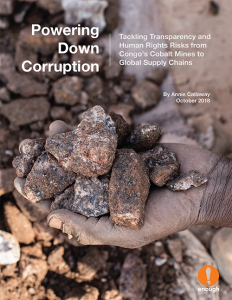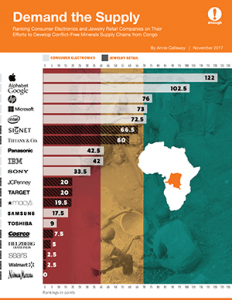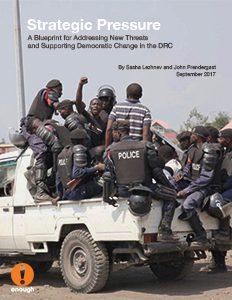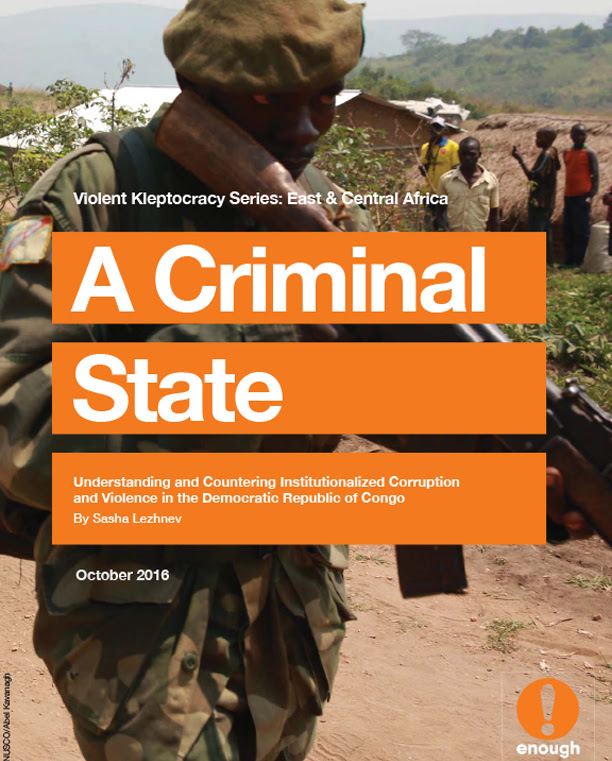Democratic Republic of Congo Reports
Powering Down Corruption: Tackling Transparency and Human Rights Risks from Congo’s Cobalt Mines to Global Supply Chains

Download the full report. Résumé analytique et recommandations By Annie Callaway Executive Summary The copper and cobalt industry in the Democratic Republic of Congo (Congo) has become “a cash cow for those in power in Kinshasa and their acolytes here in the [Lualaba] province,” a miner at a cooperative in Kolwezi city told the Enough Project in February, 2018. “It’s millions and millions of dollars that they have been reaping to fill their pockets for years.”[i] A Congolese representative from a nongovernmental organization focused on natural resource transparency further warned: “The increase in international demand for cobalt is likely to ...
Demand the Supply: Ranking Consumer Electronics and Jewelry Retail Companies on their Efforts to Develop Conflict-Free Minerals Supply Chains from Congo

The Enough Project’s 2017 conflict minerals company rankings examine 20 of the largest companies, as defined by market capitalization, in two of the industries which consume the most tin, tungsten, tantalum, and gold: consumer electronics and jewelry retail ...
Strategic Pressure: A Blueprint for Addressing New Threats and Supporting Democratic Change in the DRC

Nearly nine months after signing a political deal aimed at ushering in a landmark democratic transition in the Democratic Republic of Congo, President Joseph Kabila’s subversion of the accord places Congo at risk of much greater violence ...
Enough Project Comment to the SEC in Support of Conflict Minerals Rule Implementation
On January 31, Acting Chairman of the Securities and Exchange Commission (SEC) Michael Piwowar welcomed interested parties to submit comments in response to a statement calling into question the current Conflict Minerals Rule. In the weeks following, numerous companies, investors, activists, NGOs, and others have come out publicly in support of the Rule. The Enough Project strongly opposes any suspension, weakening, or repeal of the current Conflict Minerals Rule, and urges the SEC to increase enforcement of the Rule. Our full comment can be found below ...
Testimony of Sasha Lezhnev – Democracy and Human Rights in the Democratic Republic of the Congo
Testimony of Sasha Lezhnev, Enough Project Associate Director of Policy, given on November 29, 2016 before the U.S. Congress’ Tom Lantos Human Rights Commission hearing on “Democracy and Human Rights in the Democratic Republic of the Congo.” ...
Activist Brief: A New Policy Approach to the Democratic Republic of Congo
If international policymakers are to have a real impact in helping Congolese reformers actually transform the system of violent kleptocracy in the Democratic Republic of Congo, they need to shift lenses. Policies should focus on creating significant consequences for those most responsible for the system of violence, corruption, and undermining of democracy. This can be done by creating new leverage using tools of financial pressure normally reserved for countering nuclear proliferation and terrorism aimed at isolating certain leaders from the international financial system, and increasing support for Congolese civil society organizations and journalists to hold the government accountable ...
A Criminal State: Understanding and countering institutionalized corruption and violence in the Democratic Republic of Congo

The Democratic Republic of Congo is not a failed state—for everyone. It is a failure for the vast majority of Congolese who suffer from abysmal security, health care, and education services. However, it is an efficient state for ruling elites and their commercial partners who seek to extract or traffic resources at the expense of Congo’s development ...
Violent Kleptocracies: How they’re destroying parts of Africa and how they can be dismantled
Millions of people have suffered and perished in the ongoing wars in East and Central Africa, including Sudan, South Sudan, Somalia, the Democratic Republic of the Congo, Burundi, Rwanda, Uganda, and the Central African Republic. The big prize in these deadly conflicts is the control of a hijacked state and the natural resource wealth of the country ...
Targeted Sanctions and Beyond: Financial and Judicial Tools for the U.S. and Europe to Help Enable Timely Elections in the Democratic Republic of the Congo
Political tensions are building in the Democratic Republic of the Congo, where sitting President Joseph Kabila is attempting to subvert the country’s constitution, hold on to power, and reduce political space ahead of the scheduled end of his second presidential term. During the past 18 months, the situation has worsened, with multiple attempts to significantly delay elections; peaceful protesters arbitrarily arrested, beaten, or killed; and the expulsion of several key international researchers or officials, including those from the United Nations Joint Human Rights Office, Human Rights Watch, Global Witness, and the Congo Research Group ...
Charcoal 101
_0.jpg)
The illegal charcoal trade in eastern Democratic Republic of Congo (Congo) has become one of the most lucrative enterprise for Congo’s most notorious and stalwart rebel group, the Democratic Forces for the Liberation of Rwanda (FDLR). In addition to financing ongoing armed conflict, the charcoal trade is threatening Virunga, Africa’s oldest national park and a protected UNESCO World Heritage Site ...

